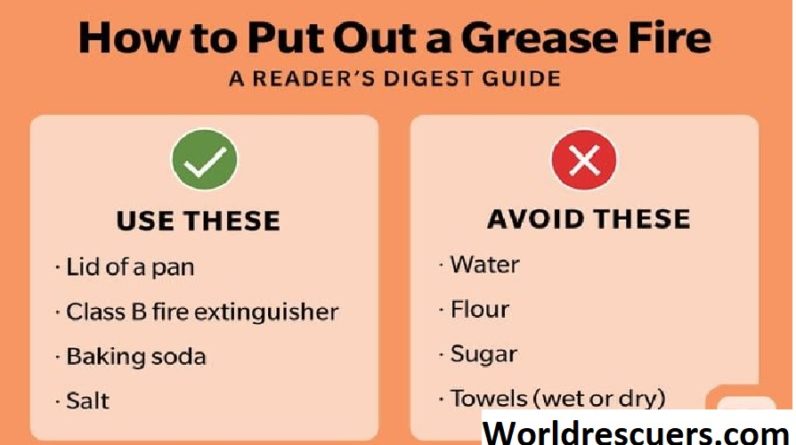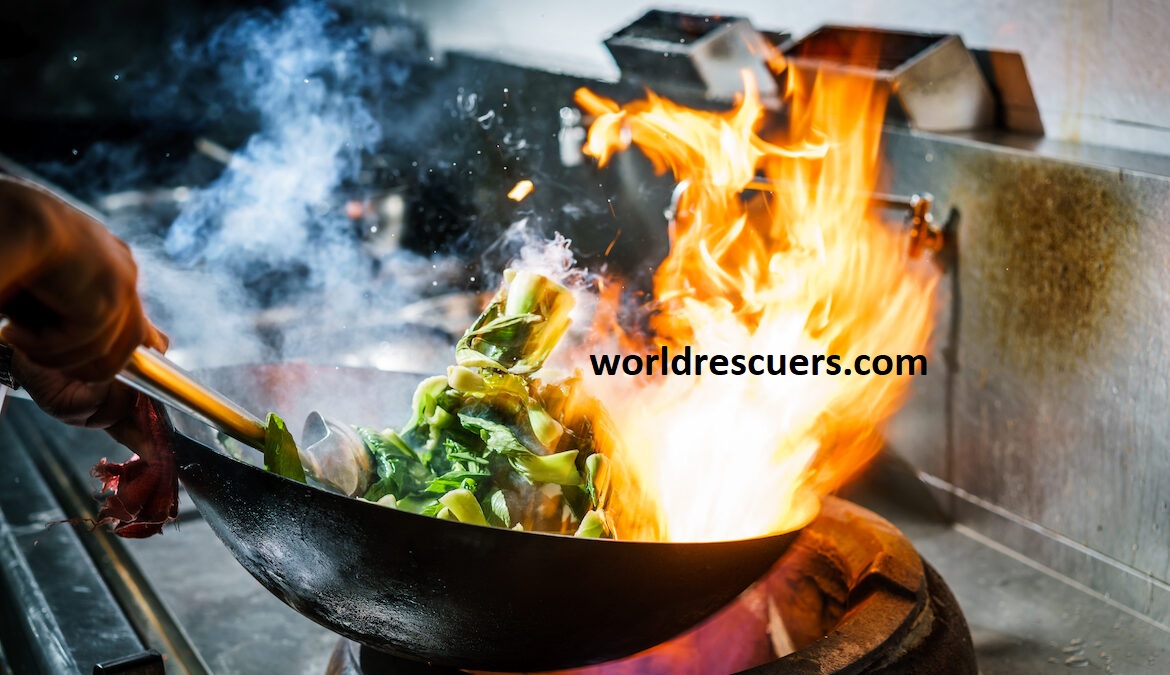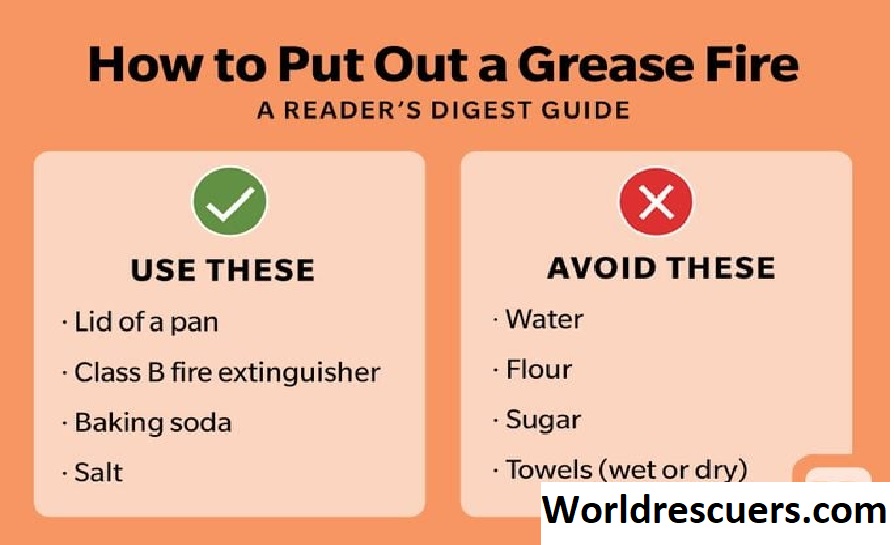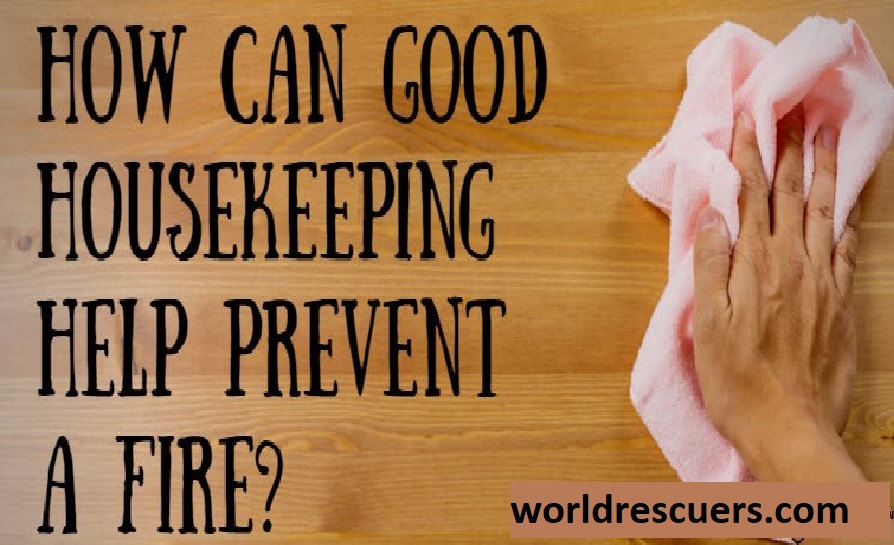
Definition:
A grease fire is a fire that occurs when cooking oil or grease becomes too hot and gets ignited, which is common in kitchens and can quickly become out of control if not handled properly.

A grease fire can be a dangerous and frightening experience, and knowing how to handle it properly can be the difference between a small kitchen mishap and a catastrophic disaster. Grease fires can start quickly and spread rapidly, so acting fast and effectively is crucial to put out the flames. In this article, we’ll discuss the best practices for putting out a grease fire and how to prevent them from happening in the first place.
Common causes of a grease fire
First, let’s understand what causes a grease fire. Grease fires occur when cooking oil or grease on a stove, or deep fryer gets too hot and ignites. Grease is highly flammable, and if left unattended, it can quickly escalate into a raging fire. Common causes of grease fires include leaving food unattended on the stove, using the wrong type of oil for frying, and overheating oil.
How to put out a grease fire?
Now that we understand the causes, let’s look at how to extinguish a grease fire. The most important thing to remember is never to use water to extinguish a grease fire. Water will only make the fire worse by spreading the hot oil, causing the flames to spread quickly and potentially causing burns or other injuries. Instead, here are some effective ways to put out a grease fire:

- Turn off the heat source. If the fire is on the stove, turn off the burner immediately. This will help prevent the fire from worsening and spreading to other areas. If the fire is in a deep fryer, unplug the appliance if possible.
- Cover the fire with a metal lid or cookie sheet. Using a metal lid or cookie sheet, carefully cover the flames. This will help cut off the oxygen supply and extinguish the fire. A damp towel can also smother the flames if you don’t have a lid or cookie sheet handy. However, be sure to use caution and avoid any direct contact with the hot oil.
- Using baking soda can also be an effective way to put out a grease fire. Sprinkle a generous amount of baking soda over the flames, which will help neutralize the fire and prevent it from spreading. Avoid using flour or other powders, as they can worsen the fire.
- Use a fire extinguisher. Use a fire extinguisher if the fire is too large to control with the above methods. Make sure to keep the extinguisher nearby and easily accessible in case of an emergency. Be sure to use a Class B or K extinguisher specifically designed to handle grease and oil fires.
- Call the fire department. Call the fire department immediately if the fire is out of control or you are unsure how to handle it. They have the proper equipment and expertise to handle any fire emergency.
How to Prevent Grease fires?
Now that we’ve discussed how to put out a grease fire, let’s look at some ways to prevent them from happening in the first place.
- Don’t leave food unattended One of the most common causes of grease fires is leaving food unattended on the stove. Always stay in the kitchen while cooking, and never leave hot oil or grease on the stove unattended.
- Use the right type of oil. When frying, use oils with high smoke points, such as canola, peanut, or vegetable oil. Avoid oils with low smoke points, such as olive oil, which can easily overheat and ignite.
- Regularly clean appliances such as stovetops and deep fryers to prevent grease buildup. Grease buildup can ignite and cause a fire.
- Keep a lid nearby. When cooking with oil or grease, keep a metal lid or cookie sheet nearby. This will allow you to cover the flames if a fire breaks out quickly.
Importance of Good housekeeping
Good housekeeping is essential for preventing grease fires in your home. Grease fires often occur due to the buildup of grease and oil on surfaces and appliances, which can ignite when exposed to high heat. Good housekeeping practices can help to prevent grease buildup and reduce the risk of fires in your home.

Here are some ways in which good housekeeping can help to prevent grease fires:
- Cleaning appliances and surfaces such as stovetops, ovens, and deep fryers are important for removing grease and oil buildup. This buildup can ignite when exposed to high heat, leading to a fire. Similarly, cleaning surfaces such as countertops, range hoods, and backsplashes can prevent grease from accumulating and reduce the fire risk.
- Proper storage of flammable liquids such as cooking oils and cleaning solvents should be stored in a cool, dry place away from heat sources. Storing these liquids near a heat source or in direct sunlight can increase the risk of a fire. Proper storage also includes using appropriate containers with tight-fitting lids to prevent spills.
- Disposing of grease properly, grease should never be poured down the drain, as it can solidify and cause blockages in pipes. Instead, grease should be disposed of in a separate container and thrown away in the trash. Additionally, using paper towels to wipe excess grease off pots and pans before washing can help prevent grease buildup in pipes.
- Using the right tools and equipment Using the right tools and equipment can help to prevent grease fires. For example, using a splatter screen when frying can prevent hot oil from splashing onto surfaces and igniting. Using the right cooking utensils, such as long-handled tongs and spatulas, can also help to prevent burns and spills.
- Educating family members about the risks of grease fires and the importance of good housekeeping practices can help prevent accidents. This includes teaching children the dangers of hot surfaces and appliances and showing them how to use cooking tools safely.
In addition to preventing grease fires, good housekeeping practices can also improve your home’s overall safety and cleanliness. Regular cleaning and maintenance can help identify potential hazards and prevent accidents. It can also help reduce the risk of other types of fires, such as electrical ones.
In conclusion, good housekeeping is essential for preventing grease fires in your home. Regular cleaning of appliances and surfaces, properly storing flammable liquids, and using the right tools and equipment are all important for reducing fire risk. By following these practices and educating family members, you can create a safe and healthy environment in your home.
Remember, prevention is key in grease fires, so don’t wait until it’s too late to take action.

Hi, I am John Smit a Captain in Fire Department City of Newyork with over years of experience in the field of Firefighting and HSE. My passion for fire safety started when I was a young boy and witnessed a neighbor’s house go up in flames along with precious lives. Since then, I had dedicated my life to ensuring the safety of buildings, properties, and individuals in case of a fire and medical emergencies.


